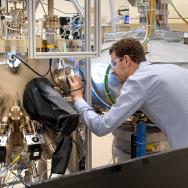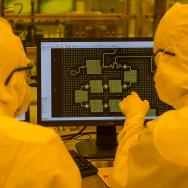The University of Chicago is seeding promising projects with Argonne National Laboratory and Fermi National Accelerator Laboratory in the emerging fields of artificial intelligence and quantum science.
The projects will tackle big questions in neuroscience, climate science, cosmological physics and quantum networking. The $400,000 in seed grants is being awarded by UChicago’s Office of Research and National Laboratories.
“When you put Argonne, Fermilab and the University of Chicago together, you have an extraordinary breadth of interests and expertise,” said Juan de Pablo, vice president for national laboratories at the University. “As we tackle new fields of science, such as AI and quantum, working together will bring tremendous benefits.”
Working closely with the Center for Data and Computing and the Chicago Quantum Exchange, the Office of Research and National Laboratories is distributing the grants for the five projects through the Joint Task Force Initiative. The initiative is a signature UChicago program designed to help Argonne and Fermilab achieve their missions.
Since the initiative launched in 2018, the University has committed $3.5 million to fund national laboratory programs and operations. The University manages Argonne for the U.S. Department of Energy through UChicago Argonne, LLC and Fermilab together with the Universities Research Association, Inc. through the Fermi Research Alliance.
AI seed projects
Three projects will use artificial intelligence to analyze huge amounts of data and images, and construct computer models that make accurate predictions and steer future experiments:
- Scientists will map the neural network of an octopus. Mapping all of the connections in the brain of an advanced animal, and then interpreting the data, could revolutionize neuroscience. The project will involve processing petabytes of data, an unthinkable amount for most institutions. Argonne’s supercomputing resources make it one of the only places in the world capable of taking on the challenge. The principal investigators for this project are Bobby Kasthuri, assistant professor in the Department of Neurobiology and a neuroscience researcher at Argonne; Peter Littlewood, professor in the Department of Physics; and Nicola Ferrier, a computer scientist at Argonne.
- Clouds play a crucial role in the Earth’s radiation budget—the balance between incoming and outgoing energy that regulates the temperature of our planet. But their behavior under future climate change is not well understood. Potential changes in cloud properties are the primary source of uncertainty in climate projections. A team of scientists from UChicago and Argonne has set out to create tools that will let us tap into decades of satellite images to understand cloud behavior. They will use state-of-the-art computer vision and machine-learning technology to classify cloud textures and patterns, and look at how those patterns have changed over time. The principal investigators for this project are Rebecca Willett, professor in the Departments of Statistics and Computer Science; Ian Foster, the Arthur Holly Compton Distinguished Service Professor in the Department of Computer Science and a senior scientist at Argonne; Elisabeth Moyer, associate professor in the Department of Geophysical Sciences; and Michael Maire, assistant professor in the Department of Computer Science.
- The origin and fate of the universe are encoded in galaxies, exploding stars, the cosmic microwave background and the billions of other objects we observe in the sky. Through cosmic survey experiments, scientists are able to observe, analyze and simulate these objects—which allows them to discover and refine the fundamental theories of cosmic evolution. Researchers at Fermilab and UChicago are using AI to automate a tool for the design, optimization and forecasting of cosmic survey experiments. The tool currently requires users to set parameters by hand for each aspect of an experiment. By automating it, scientists will make it more reliable and efficient. In the long term, they’ll significantly lower the cost of experiments and make more discovery possible. The principal investigators for this project are Yuxin Chen, assistant professor in the Department of Computer Science, and Brian Nord, an associate scientist at Fermilab.
Quantum seed projects
Quantum networks—which would allow for the unhackable transmission of information, among other major advances—depend on “entanglement.” It’s a law of quantum physics that allows scientists to link particles so that they remain connected by a “shared state” even if they’re miles apart. After distributing an entangled pair of particles between two locations, you can send—or “teleport”—information between them.
Due to a variety of scientific and engineering challenges, sending quantum information even a short distance is still difficult. But seed grant recipients are working to turn the promise of quantum networks into a large-scale reality:
- Scientists at Argonne and UChicago will use ions of erbium (a chemical element) as nodes in quantum networks. The unique properties of erbium ions, along with Argonne’s advanced nanofabrication resources and UChicago’s complex fiber cryogenic measurement capabilities, will allow for the creation of devices that may more reliably transmit quantum information over longer distances. The devices will be tested within the Argonne-Fermilab Quantum Link. The principal investigators for this project are Alan Dibos, an assistant scientist at Argonne, and Tian Zhong, assistant professor in the Pritzker School of Molecular Engineering.
- Scientists can use atomic defects in diamonds to encode quantum information. But current technology doesn’t take full advantage of the properties of the diamond. Scientists at Argonne and UChicago are developing a new method. By upgrading an atomic force microscope with a metallic probe tip, they will create special cavities (defects) smaller than a nanometer in ultra-thin diamond membranes—and characterize these defects with precision. This will allow them to optimize quantum coupling, the linking of particles that creates quantum entanglement. The principal investigators for this project are Jeffrey Guest, a scientist at Argonne, and Alexander High, assistant professor in the Pritzker School of Molecular Engineering.

